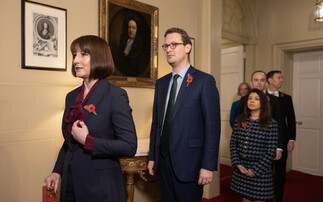Claire O'Neill's blistering testimony yesterday was full of Westminster Village drama, but it also raised serious questions for the government's climate agenda
For close followers of Westminster Village dramas Claire O'Neill's appearance before the BEIS Select Committee of MPs yesterday morning was pure political box office.
Here was a sacked former Minister with a full armoury of axes to grind and a virtual platform on which to wield them. The topics under discussion were the COP26 Summit preparations, climate diplomacy, and the UK's wider net zero strategy. O'Neill was not about to miss her various targets.
The Number 10 operation? Embracing "a cavalier attitude", lacking gravitas, and largely unaware of what a UN Climate Summit actually entails. Thwack.
Whitehall? Hamstrung by turf wars, a Treasury that never wanted to host COP26, and draconian hiring restrictions. Thwack.
Relations between Downing Street and Holyrood? Undermined by petty conversations and naked tribalism. Thwack.
The Prime Minister's senior advisor (an unnamed Dominic Cummings)? Unaware COP26 needed a President, peddling unfounded accusations, and guilty of "extraordinary ineptitude and amateurishness". Thwack.
Here was a reminder that despite some of the whispers about her suitability for an extremely delicate diplomatic role (and O'Neill's comments on her frustration at the glacial progress of UN negotiations hinted at why some officials harboured concerns about her presidency), O'Neill was always an extremely impressive and eloquent political operator. Revenge, as they say, is a dish best served cold, preferably after your ousted adversary has become a byword for over-reach and trust-imploding arrogance.
Ultimately, however, for all the sense of a curtain being drawn back there was nothing massively revelatory about O'Neill's testimony. Boris Johnson is not really on top of the details. Dominic Cummings thinks he knows a lot more than he does. Whitehall struggles to prioritise climate action. I mean, who knew?
More interesting and more important were O'Neill's broader assessments of the COP26 challenge and how to maximise the gains from this crucial Summit.
The government has undoubtedly made significant progress in its preparations in recent months. As the new COP26 President and Business Secretary Alok Sharma may have an absurdly packed in-tray, but he has not yet put a public step wrong in his Presidential role. The core team has been strengthened and there is no doubt the covid-induced delay has given officials and diplomats the space they needed to lay the groundwork for the event. Crucially, it looks as if Sharma may prove to be a lucky general, with President Trump's defeat, improving EU, US, and China relations, and perhaps even a Brexit deal, all likely to boost the chances of a successful Summit.
But at the same time, as O'Neill hinted, the government's failure to properly engage Nicola Sturgeon, as well as those with direct COP experience (think Gordon Brown, Ed Miliband, and Amber Rudd) remains an example of political tribalism at its worse.
More broadly it is hard to shake the sense that Number 10 and a few too many senior Ministers have still not internalised quite how big a deal this Summit is both for the climate and the UK's post-Brexit diplomatic standing. The parallels O'Neill drew with the London Olympics are valid, and yet with less than 12 months to go few would characterise the government as straining every sinew to put its best face to the world on the issue that will define the century.
The government needs to be prioritising climate action - and be seen to do so - at every turn, so as to increase pressure on other nations to do likewise. There have been plenty of steps forward in recent months and more will surely follow. But a relatively modest £12bn green recovery package, a decarbonisation plan that does not currently meet carbon targets, cuts to overseas aid, and a failure to embed climate action in trade negotiations do not scream 'this is our top priority'.
O'Neill was speaking on the same morning as a new analysis revealed how the net zero pledges put forward by major economies in recent weeks have pulled projected warming for the century down to 2.1C, putting the goals of the Paris Agreement within reach for the first time. The delivery of those net zero targets requires the fastest and biggest industrial revolution in history, and as such there is no room for complacency. But five years on from that dramatic night in the French capital when the treaty was agreed the progress has been truly startling.
As such now is the time to nurture and build upon that momentum. As much through luck as judgement the home of the first industrial revolution now has a pivotal role to play in ushering in the industrial revolution that will bring the fossil fuel age to an end. Every single Minister and official in government needs to be cognisant of that fact. If they are not yet aware of the scale of what is at stake they could do worse than visit the BEIS Committee website, order in some popcorn, and watch O'Neill's evidence.
A version of this article originally appeared in the BusinessGreen Overnight Briefing newsletter, which is available to all BusinessGreen subscribers.









